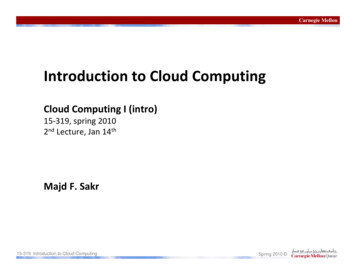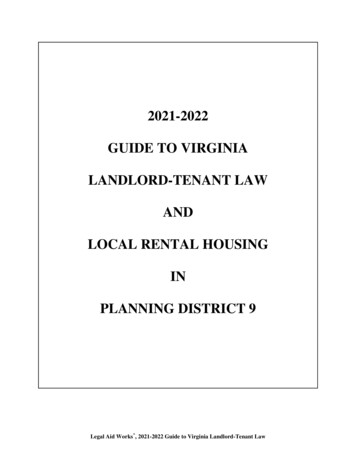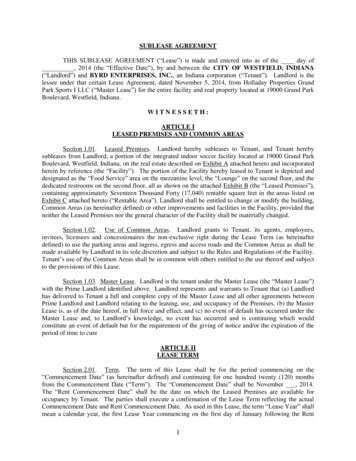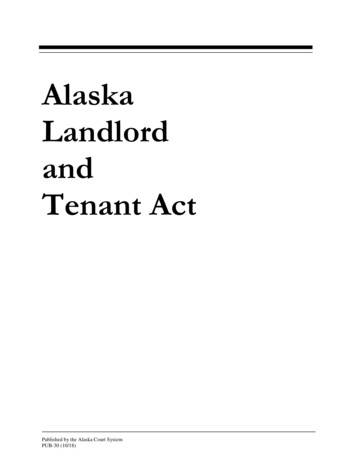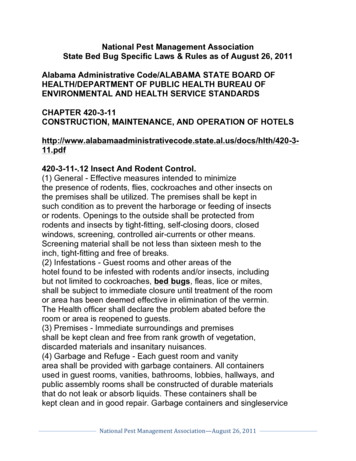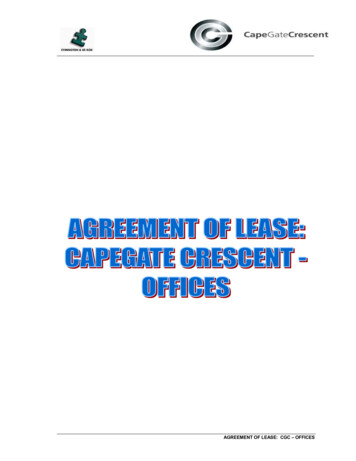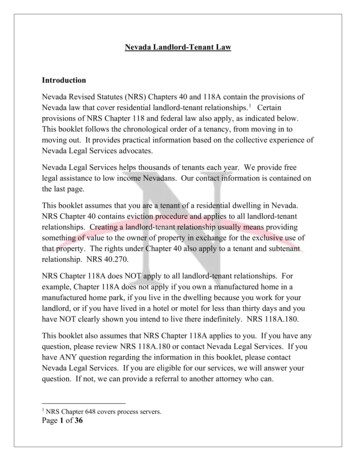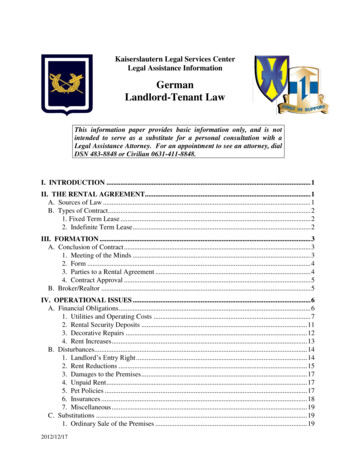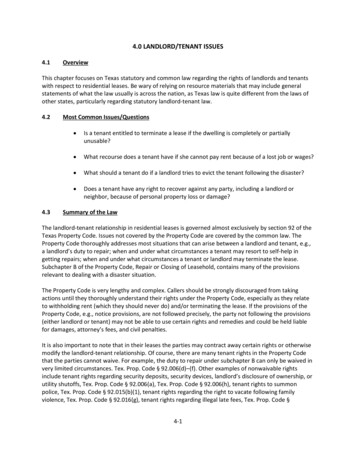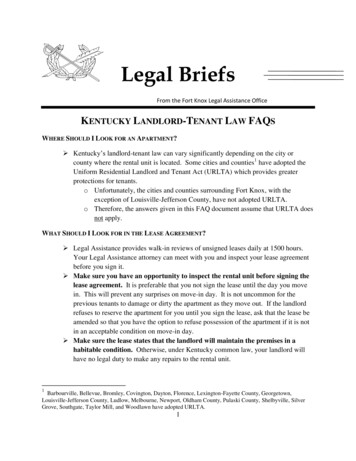
Transcription
Legal BriefsFrom the Fort Knox Legal Assistance OfficeKENTUCKY LANDLORD-TENANT LAW FAQSWHERE SHOULD I LOOK FOR AN APARTMENT? Kentucky’s landlord-tenant law can vary significantly depending on the city orcounty where the rental unit is located. Some cities and counties1 have adopted theUniform Residential Landlord and Tenant Act (URLTA) which provides greaterprotections for tenants.o Unfortunately, the cities and counties surrounding Fort Knox, with theexception of Louisville-Jefferson County, have not adopted URLTA.o Therefore, the answers given in this FAQ document assume that URLTA doesnot apply.WHAT SHOULD I LOOK FOR IN THE LEASE AGREEMENT? Legal Assistance provides walk-in reviews of unsigned leases daily at 1500 hours.Your Legal Assistance attorney can meet with you and inspect your lease agreementbefore you sign it. Make sure you have an opportunity to inspect the rental unit before signing thelease agreement. It is preferable that you not sign the lease until the day you movein. This will prevent any surprises on move-in day. It is not uncommon for theprevious tenants to damage or dirty the apartment as they move out. If the landlordrefuses to reserve the apartment for you until you sign the lease, ask that the lease beamended so that you have the option to refuse possession of the apartment if it is notin an acceptable condition on move-in day. Make sure the lease states that the landlord will maintain the premises in ahabitable condition. Otherwise, under Kentucky common law, your landlord willhave no legal duty to make any repairs to the rental unit.1Barbourville, Bellevue, Bromley, Covington, Dayton, Florence, Lexington-Fayette County, Georgetown,Louisville-Jefferson County, Ludlow, Melbourne, Newport, Oldham County, Pulaski County, Shelbyville, SilverGrove, Southgate, Taylor Mill, and Woodlawn have adopted URLTA.1
o Many lease agreements will not contain this language because they have beenwritten to provide the greatest possible protection for the landlord. However,any decent landlord anticipates that he will have to make some reasonable andnecessary repairs during your tenancy.o If the landlord refuses to add this language, you may want to look for anapartment elsewhere. It is possible that the landlord intends to makenecessary repairs but does not want to amend the lease because he doesn’tthink it is necessary to do so. However, if the apartment falls into disrepair,and the landlord refuses to correct the issues, you will still be responsible forpaying the rent. Under Kentucky common law, the lease agreement is controlling. Therefore, youshould read the lease carefully. You will have to decide whether the terms areacceptable to you or not. If not, you can always try to negotiate the terms with thelandlord before you sign the lease. For instance, you could ask that the terms statethat “both parties agree to be bound by the Uniform Residential Landlord and TenantAct, KRS §§ 383.500 – 383.715. “ However, the landlord is under no obligation toaccept the terms you offer, and no matter what is discussed, it is important that youunderstand the terms as they are finally stated in the written lease agreement. Try toanswer the following questions while reading the lease in order to decide if it is anagreement you are willing to live with.o Does the lease state the correct address of the rental unit that you inspected?o Does the lease reflect your understanding of: the amount of rent due, whenand how often it is due, the date you may move in, the duration of the lease,and any refund provision should you move out early?o Does the lease state how many occupants are allowed as tenants?o What happens at the end of the lease term? Does the lease automaticallycontinue upon a month to month basis (or even renew for a larger period oftime)? What steps do you have to take to prevent the lease from automaticallycontinuing?o Is there a security deposit? On what grounds can the landlord withhold yoursecurity deposit?o Does the lease state who is responsible for payments of heat, electricity,water, gas, telephone, internet, garbage removal, etc ?o Does the lease state who is responsible for repairs?o What are the rules regarding pets, musical instruments, stereos, T.V. antennas/satellites, washers, dryers, etc ?o Who is responsible for yard maintenance?2
o What is the penalty for terminating the lease early? Does the lease state thatthe landlord may or must seek a replacement tenant and credit any rentsrecovered towards your lease in the event of early termination? If you have to terminate your lease early due to a deployment orchange of station, the Servicemembers Civil Relief Act (SCRA)prohibits your landlord from assessing any penalties. Any provision inthe lease that states otherwise is void, and you can probably ignore it.However, the existence of such a clause may be a sign of trouble.o When can the landlord enter the apartment, with or without your consent?o Is parking available?o Can you assign or sub-let the apartment, with or without the landlord’spermission?o Does the landlord disclaim any liability for damage to your personal property?o How can the lease be amended by either the tenant or the landlord?o Are there “quiet hours” or other rules regarding use of common areas?WHAT SHOULD I DO BEFORE I MOVE IN? Before you take possession of the apartment, make sure you and the landlord createand sign a list of existing defects/ damage. Move-in day can be stressful for manyreasons, but do not sign the list without inspecting the apartment to make sure it isaccurate. Keep a copy of the list for your records. If the landlord tries to withholdyour security deposit when you move out, you will need this list as proof of thecondition of the apartment at the beginning of your tenancy. Do not rely on the landlord’s oral promises to clean or otherwise fix the apartmentafter you move in. If the apartment is not acceptable on move-in day, you shouldhave the landlord state in writing what action he or she will take to remedy thesituation. This writing should include the following language: “If Landlord does notsatisfactorily remedy the above defects within [number of days you are willing towait] days from the date of this writing, then Tenant has the option to terminate thelease, move out, and pay no more rent.” Again, if the landlord truly intends to cleanor fix up the apartment as promised, he should have no reason not to put it in writing.o Make sure any written promise complies with the amendment processprovided for in the original lease agreement. Make sure you are given possession of the entire area that you were promised underthe lease. If the landlord has withheld possession of some portion of the leasedpremises, you have two options: (1) you can refuse possession of the entire premises;3
or (2) you can accept possession of the premises and offer to pay a reduced rentalamount until you are given possession of the entire premises. Designate a safe place in the apartment to keep all your important documentsconcerning your lease agreement. You should keep a copy of your lease agreement,your move-in checklist, any written communications between you and your landlord,and any bills, statements, or work orders concerning the maintenance of theapartment.WHAT SHOULD I DO IF MY LANDLORD REFUSES TO MAKE REASONABLE AND NECESSARYREPAIRS? If the lease agreement does not state that the landlord will make repairs or maintainthe premises, then your rights under the law are limited.o Make an appointment to see a Legal Assistance attorney and remember tobring a copy of your lease agreement, your move-in checklist, and anypictures or proof of the intolerable situation.o While your legal options are probably limited, the Legal Assistance Officemay assist you in drafting a demand letter, encouraging your landlord to dothe right thing.o You should be prepared to continue to pay rent, whether or not you stay in theapartment, until the lease terminates or your landlord releases you from theagreement. If the lease agreement does state that the landlord will maintain the property in ahabitable condition, you may have additional options.o You should take the same initial steps as listed above, but if the situationbecomes completely intolerable, you may decide to move out based on thelegal principle of “constructive eviction.” However, this is a high-riskstrategy which can be difficult to pursue. Constructive eviction occurs when an act or omission of the landlordcreates an intolerable living environment for the tenant, and the tenantvacates the premises as a direct result of these conditions. If you areconstructively evicted, the lease is terminated and you can move outand stop paying rent. But be advised: You must give written notice to the landlord, stating thespecific problems that have created the intolerable conditions4
and a date by which the landlord must correct these problemsin order to maintain the lease agreement, before you move out. Also, if you can afford to do so, you should continue to payrent into a separate account as a sign of good faith. The moneywill not go to the landlord, but if the case goes to trial, you canshow the court that you are not simply trying to avoid payingrent. If your landlord ignores the notice, and you feel forced to moveout and stop paying rent, your landlord may decide to sue youin state court. If he does, you will have to prove that you were constructivelyevicted from the apartment. This is difficult to prove unlessextremely severe circumstances exist (e.g., water being turnedoff for several weeks). Additionally, understand that LegalAssistance attorneys will not be able to represent you in statecourt. You will need to hire an attorney to represent you. If you lose in court on your claim of constructive eviction andyour lease requires you to pay costs and fees if you lose incourt, you will have to pay the amount of the judgment, pluspay for your landlord’s court costs and attorney fees. As you can see, successfully asserting constructive eviction canbe difficult. You should consult with a Legal Assistanceattorney before undertaking this strategy.WHAT SHOULD I DO BEFORE I MOVE OUT? Read your lease agreement as soon as you know that you plan to move out of theapartment. There may be deadlines for notifying your landlord that you do not planto continue the lease at the end of the term. Make sure to clean the apartment and fix any minor damage that you caused duringyour tenancy. Remember, you represent the Army. If you are a good tenant, chancesare good that the next Soldier to rent the apartment will be treated with respect. Make sure you and the landlord create and sign a list of any existing defects. Moveout day can be just as stressful as move-in day. Nevertheless, this move-out checklistmay be your only proof that you left the apartment in good condition; make sure it isaccurate and signed by both you and the landlord.5
WHAT SHOULD I DO IF MY LANDLORD WON’T RETURN MY SECURITY DEPOSIT? Make an appointment to see a Legal Assistance attorney and remember to bring acopy of your lease agreement, your move-in checklist, your move-out checklist, andany pictures or proof of the condition of the apartment before and after your tenancy. A Legal Assistance attorney will be happy to assist you in composing a letterdemanding the return of your security deposit so long as you bring in the supportingdocumentation listed above.If you have any questions concerning these matters, please call the Legal Assistance Office for anappointment at (502) 624-2771 or visit our website at www.knox.army.mil/center/sja/. Our hours ofoperation are Monday, Tuesday, Wednesday and Friday, 0900 – 1600, and Thursdays 1300-1600. TheFort Knox Legal Assistance Office is located in Building 1310, Pike Hall at the corner of Knox and ThirdStreet.6
Kentucky's landlord-tenant law can vary significantly depending on the city or county where the rental unit is located. Some cities and counties1 have adopted the Uniform Residential Landlord and Tenant Act (URLTA) which provides greater protections for tenants. o Unfortunately, the cities and counties surrounding Fort Knox, with the
